Summer reissue: If you thought jigsaw puzzles were meant to be relaxing, think again. Tara Ward lifts the lid on one of the Masters Games’ most intense and demanding events.
The Spinoff needs to double the number of paying members we have to continue telling these kinds of stories. Please read our open letter and sign up to be a member today.
After nearly three fervid hours of puzzling, it has come down to this. Inside the Union food hall at the University of Otago, two teams are neck-and-neck. In front of them, a 1000-piece jigsaw puzzle. Beside them, the last few stubborn pieces. Four pairs of hands move frantically across each table, rushing to connect the final pieces of sky and trees. A buzz of anticipation fills the room. Officials hover in the aisles, stopwatches in hand, ready to pounce. The small crowd of spectators shift their heads from left to right like they’re watching the final at Wimbledon, craning their necks to see which team will claim glory first. A single, precious puzzle piece lies silently on the floor, lonely and forgotten.
Every piece is crucial. Every second counts. Welcome to the wild world of competitive jigsaw racing.
Competitive speed puzzling is exactly as it sounds: a race to finish a jigsaw the fastest. It’s the intriguing sport that turns a relaxing hobby into an intense, adrenaline-fuelled challenge, testing players’ mental agility, concentration and attention to detail under pressure. Jigsaw racing is growing in popularity as more of us discover the health benefits of puzzling, with numerous speed puzzling events held both virtually and in person around the world. Fifty countries were represented at last year’s World Puzzling Championships in Spain, where the winning team finished two 1000-piece puzzles in an astonishing one hour and 30 minutes.
Now, it’s Dunedin’s turn. Over two days in the New Zealand Masters Games, jigsaw athletes are competing for glory in team and individual categories, sprinting to build a 1000-piece puzzle in a matter of hours. It’s the first time jigsaw racing has featured at the Dunedin games, after it debuted at the Whānganui Masters in 2021. Players filing into Dunedin’s vast jigsaw arena range in age from their 20s to their 70s, travelling from as far as Auckland’s New Lynn to compete. In the world of speed puzzling, jigsaws aren’t just for the old or boring – and nor for the faint of heart.
An unexpected scandal unfolds in the nervous moments before the Dunedin event begins. As teams enter the puzzle pitch, one over-excited team begins to unwrap their jigsaw early, breaking a cardinal rule of competitive puzzling. Only after a hearty 10 second countdown (which the entire room joins in on) are the 21 teams permitted to feverishly rip off the paper to reveal the hidden jigsaw image. It’s a moment that will define the next four hours. A picture with bright colours and crisp shapes is best for speed puzzling, while large areas of sky or land – spaces that look the same – are not.
Once these puzzlers clap eyes on their jigsaw, a quiet groan echoes around the room. This is not a puzzle built for speed.
“Unfortunately for me, the image on the puzzle dictates whether or not I’m gonna have fun,” Donnalouise Gragg foreshadows before the event. The Dunedin woman is one of New Zealand’s most experienced puzzlers, having assembled a 54,000 piece puzzle in her own home and attended both the World Puzzling Championships and the Australian Jigsaw Puzzle Association Nationals last year. Having placed 23rd out of 160 competitors in Australia, Gragg describes herself as a “mid-range” speed puzzler – not in the bottom, but not in the top, either. “A lot of people think I’m really fast, but on a world scale, people can do a 500-piece in 30 minutes. I don’t know how. That blows my mind.”
It’s game on for Gragg’s team The Dunedin Dissectologists, with a frenzy of activity in the first few minutes. Alongside teams like We Come in Pieces, The Jig(Saw) is Up and Getting Jiggy With It, they eagerly flip and twist their pieces into order, organising them in oven trays and colourful plastic containers bought from home. Sorting is key to successful speed puzzling, with competitors searching for patterns, colours and shapes from the moment the pieces are tipped from the box.
For the next four hours, puzzlers keep a laser focus on the thousand tiny pieces of cardboard scattered in front of them. Their fingers move nimbly, eyes shifting, backs bent as the Cardrona Hotel begins to form. The Dissectologists keep their heads down, all four members confident in their own role. “We’re always talking about the image, and saying are we full sorting? Are we full flipping? Who’s working on what?” Gragg says. They’ve been puzzling together for about two months, but ramped up their practice over the past few days, completing five 1000-piece puzzles together. “Maybe we’ve overprepared, I don’t know,” Gragg worries.
It’s a stark contrast to the action in the corner, where Team Bird and Chook have laid out their snacks (carrots, cake and chocolate) and are laughing their way through their puzzle. Best friends Toni Kennedy (Bird was a childhood nickname) and Kim Lammond (her mum calls her Chook) arrive wearing the matching T-shirts they had specially made for the event, a sartorial vision of birds, rainbows and unicorns. They both enjoy puzzling for its calming, mindful qualities, with Kim discovering that jigsaws helped to ease the anxiety she experienced during breast cancer treatment.
Bird and Chook know they won’t feel that usual sense of calm today, but they’re focused on finishing under the four hour limit. Mostly, they’re here to have a good time. “We’re not pros, we’re just people who like puzzles,” Lammond explains. As one of the few teams of two, they’re realistic about their chances of winning, but wonder if their high energy and constant chatter might work as a strategy. “Like on The Amazing Race, when the couples yell at each other and the others get deterred,” Lammond reckons, explaining how they celebrate every tiny piece that slots into place. “We’re like ‘man, this looks SO good!’”
Charlotte McKay is another puzzler who loves the meditative power of jigsaws. “It’s great downtime, but I still feel like my brain is activated. There’s always something achievable about doing a jigsaw,” she says. The performer, fitness coach and office manager has been passionate about puzzling for 20 years, and the opportunity to enter the individual jigsaw race was a dream come true. “I am quite a competitive person, and when I heard about this, I’ve never felt more seen. Competitive jigsaw puzzling? That’s my nirvana.”
Previously, McKay’s biggest challenge had been her cat vomiting on her puzzle; now she’s about to compete against 20 other individuals through nine hours of intense, sustained puzzle action. McKay can knock a 1000-piece puzzle off in a few hours at home, but after watching lots of jigsaw racing videos online, she knows speed puzzling demands a more purposeful, efficient approach. “I really thought when I entered, ‘I’m an ace puzzler, I’m going to have a gold medal’,” she jokes. “Then when I actually found out that this is a whole thing, I’m like, ‘oh noooo’.”
As the Dunedin summer sun begins to beam through the University food hall, players mutter about the shadows the sunlight casts on their pieces. It will reach 31C in Dunedin today, and after the first hour, a stuffy hush falls on the room. By the second, puzzlers are beginning to hurt. They shift around their tables, swapping positions when a team member hits a jigsaw wall, pausing to stretch their necks and backs. “I’m achieving nothing,” one says. “I need the roof of the car,” another pleads. “It’s a shitshow,” Lammond tells Kennedy, searching for a matching piece of that never ending winter sky.
An older woman with hair the same colour as the Cardrona snow plonks herself down in a plastic chair to watch. “I’ve just finished playing table tennis,” she announces to the captivated group of spectators who’ve gathered. Strangers on the sidelines quickly become friends, as people pull out their phones to show off photos of their favourite jigsaws (Van Gogh’s Sunflowers, a classic). It’s this instant bond that Gragg loves the most about puzzling. “At Worlds, people don’t speak the same language, but put a jigsaw puzzle down on the table and people will just gravitate,” she says. “You don’t even need to speak and you’re having a good time.”
That day, nobody had a better time than Dunedin Dissectologists. Two hours, 41 minutes and 21 seconds after the jigsaws were unwrapped, the four puzzlers raise their hands in the air, triumphant and exhausted. Team Tabulous finish second a mere two minutes and 51 seconds later, while Bird and Chook persist with that bleak Central Otago sky until the bitter end. The following day, McKay will give a spectacular display of stamina in the individual race, enduring nine gruelling hours of puzzling to solve a 1000-piece jigsaw of Larnach Castle so challenging that other competitors leave in tears.
Regardless of the results, puzzling was the winner on the day. NZMG manager Vicki Kestila admits she wasn’t sure what to expect with jigsaw racing, but was quickly won over. “We were blown away by how popular it was in terms of participation but also by how many spectators it attracted,” she says. “People were fascinated by the ins and outs of it all.”
Even the victorious Gragg, who’s preparing to return to the World Championships in Spain later this year, says the most important thing about competitive puzzling is that everyone has a good time. Bird and Chook agree. “If we don’t enjoy it, then what’s the point?” Kennedy/Bird asks. And what about McKay, who never wants to see a photo of Larnach Castle ever again? “I hope that I’m subverting somebody’s stereotype about what a jigsaw puzzler is,” she says. “Even though this is the Masters Games, jigsaw puzzling can be cool, kids.”
First published February 17, 2024.










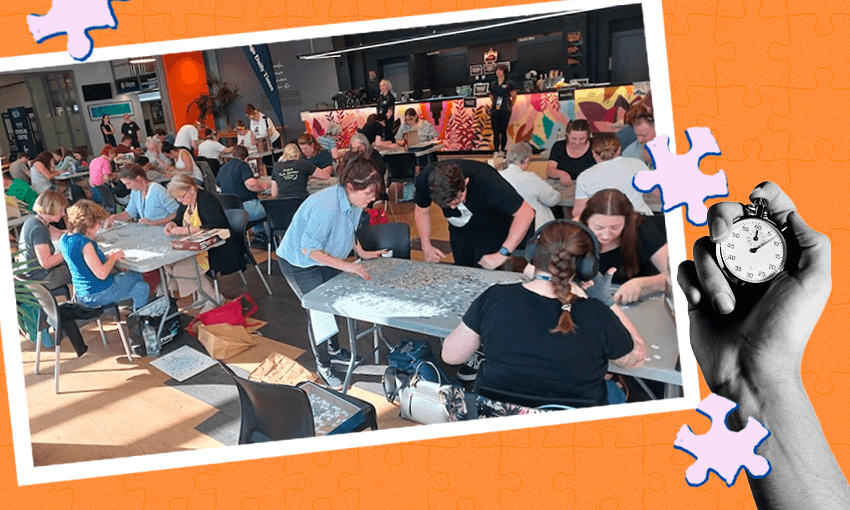
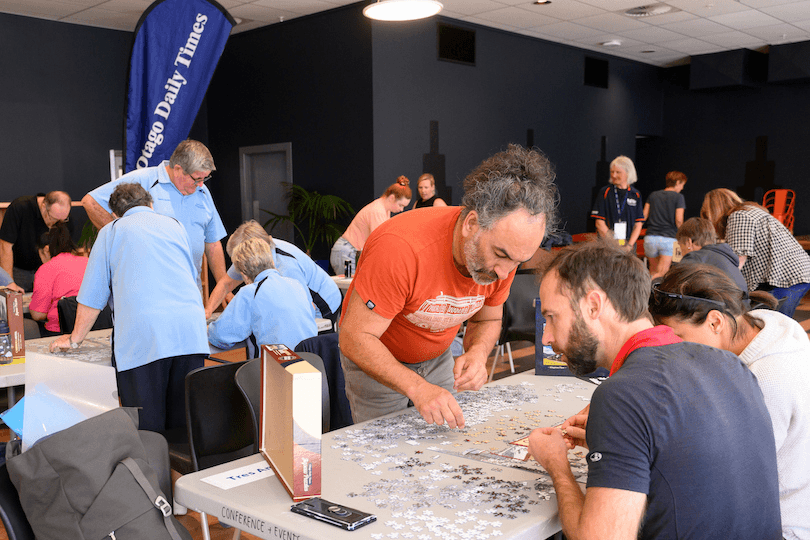
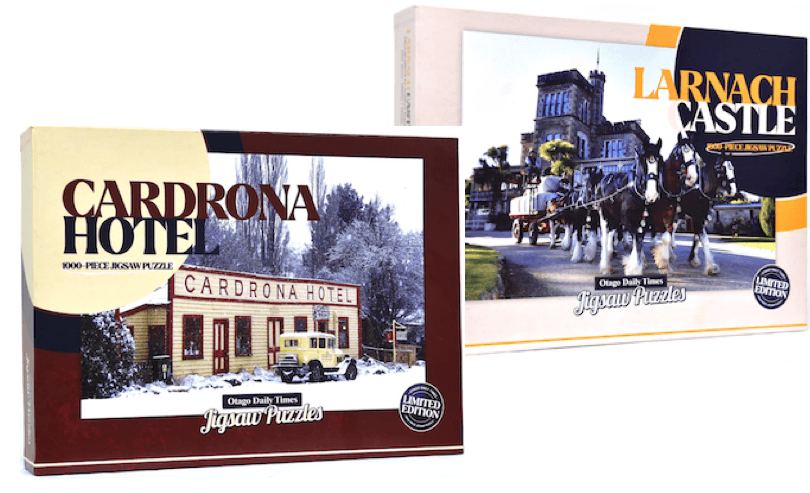
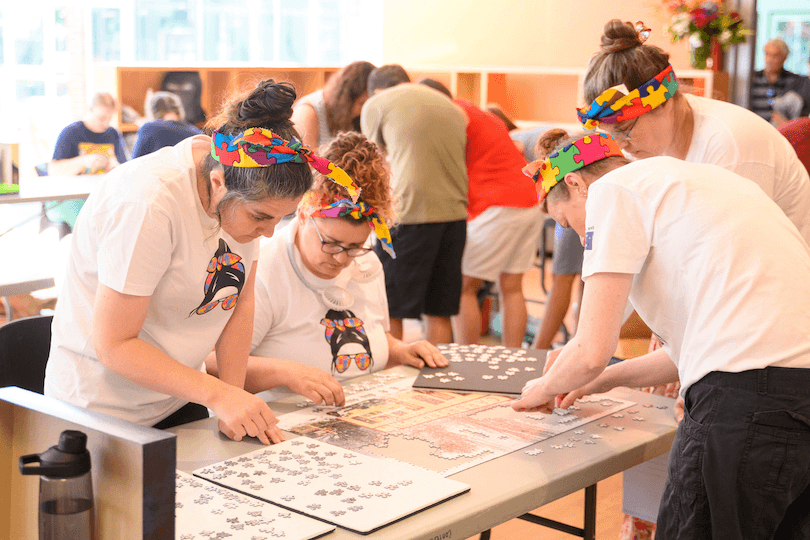
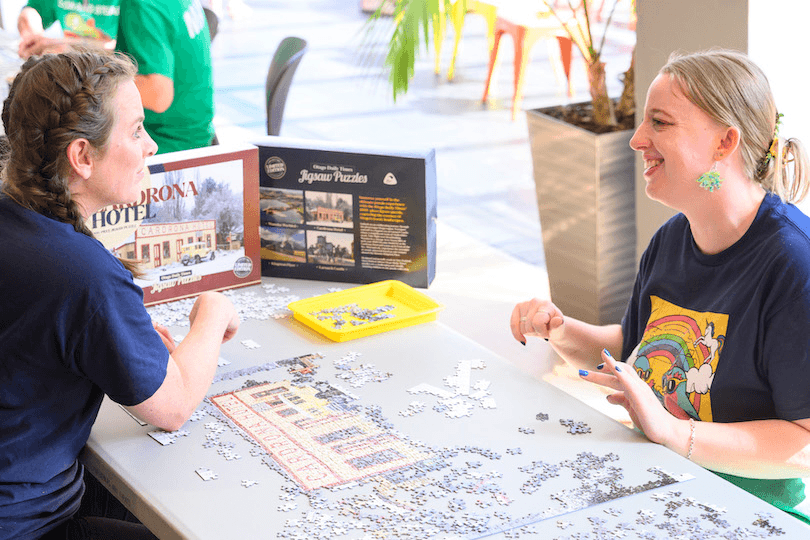


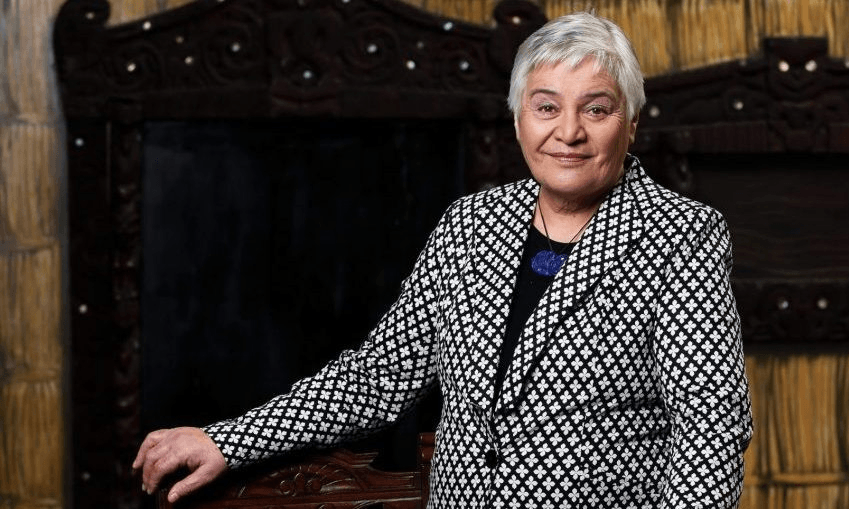


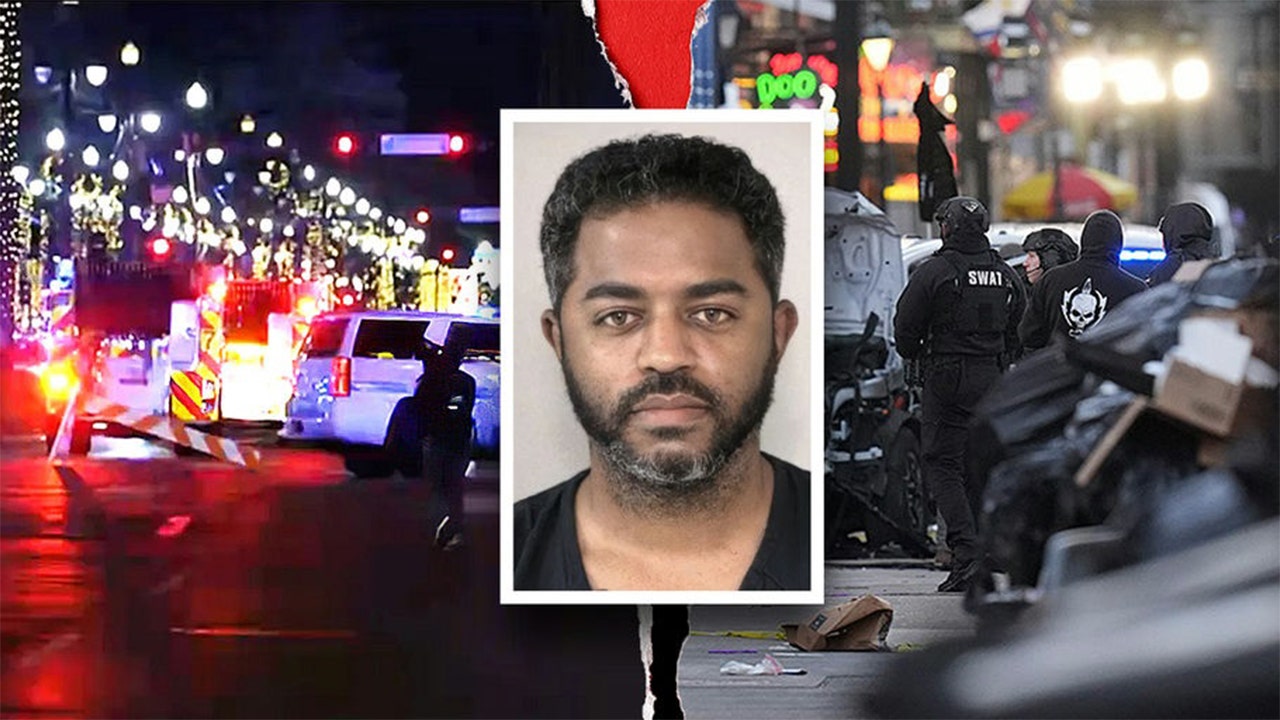




Discussion about this post